Category: Worldwide
Category Added in a WPeMatico Campaign

The Office is a sitcom that sits firmly in the past, which means that as time goes on and social mores change, there may be some particularly cringeworthy moments in your rewatch you may not have remembered. “Diversity Day,” the show’s second episode in its uneven first season, is a very strong example of some kinds of humor that might ring more as gross than funny here in the present.
A deleted scene from a Halloween episode of The Office is another example of something that, even in the moment, they thought would be a bit too dark. And according to Screen Rant, another potential scene was cut before it ever got shot because it would be a bit too offensive to some.
According to some excerpts of The Office: The Untold Story of the Greatest Sitcom of the 2000s (a new oral history of the show), via Entertainment Weekly, the idea came from Aaron Schure, who wrote on Seasons 5 through 8 and wanted Michael Scott to have a “Christlike” awakening following an incident where he sort of gets crucified on a garage door:
The episode would have focused on Michael playing basketball at his house with Jim and presumably other coworkers. At some point, the garage door was supposed to open as Michael’s shirt got caught, pulling him up. Michael would have been left hanging from the door directly under the basketball hoop, which served as the crown of thorns worn by Jesus ahead of his crucifixion. None of Michael’s friends would have noticed, leaving him hanging there overnight. The next day, Michael would go to work “feeling Christlike” due to the fact that he was crucified by the garage door.
The storyline never went anywhere, but it is a good example of how Michael Scott as a character was always on the very edge of what would be acceptable and still funny. Some ideas, however, were simply too much for some.
[via EW]
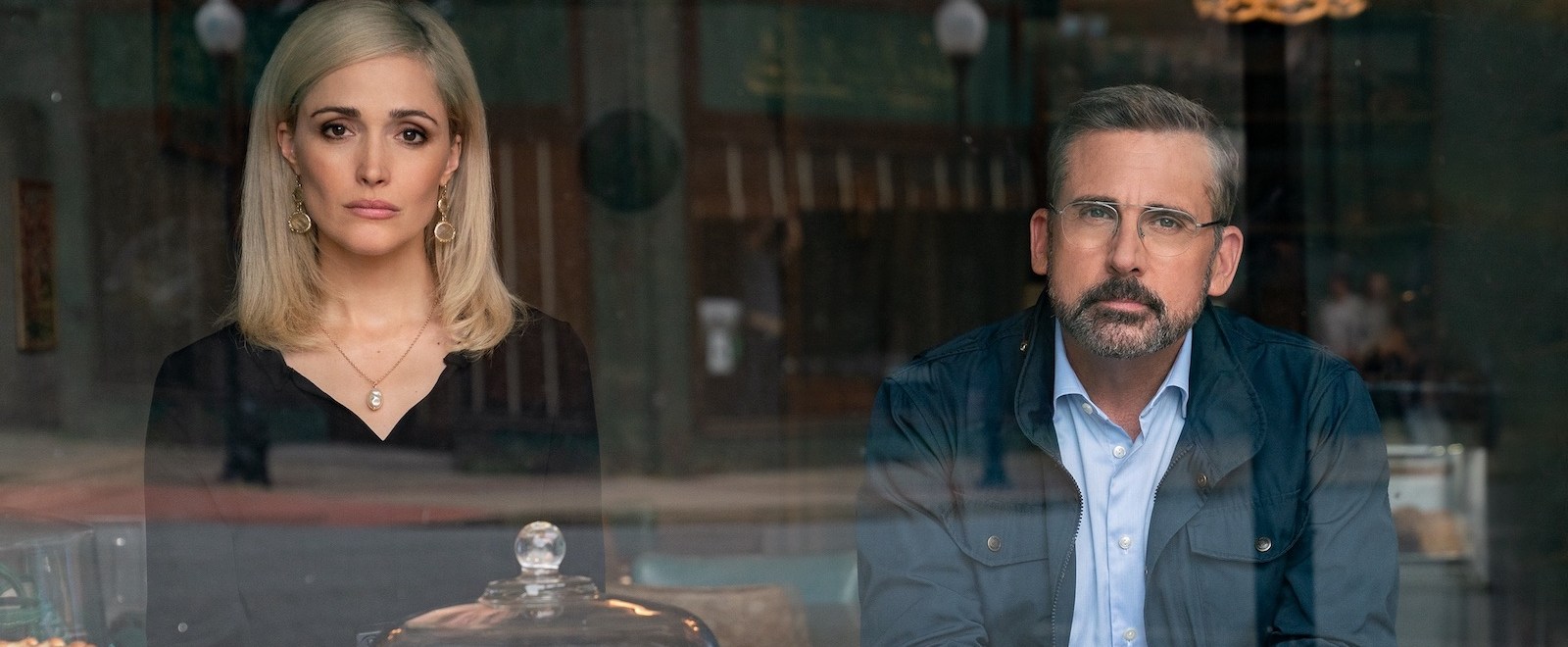
There’s no doubt people expecting Irresistible, the new film directed by Jon Stewart, to be the scathing kick in the ass America needs right now will surely be disappointed. And there are a couple different things going on here. While I was watching Irresistible, I found myself surprised that after all this we’ve collectively gone through since Stewart left The Daily Show in 2015, that his movie would be a kind of inoffensive, somewhat slight political comedy that felt like in the same vein as watchable yet forgettable movies like My Fellow Americans; or Welcome to Mooseport; or Jay Roach’s Will Ferrell, Zach Galifianakis vehicle, The Campaign. It just seemed a little weird Stewart wasn’t trying to make something profound.
But, then I accepted that, for whatever reason, this is what Stewart wanted to make. I mean, who am I to judge the type of movie a directors wants to make? If Jon Stewart wants to make Welcome to Mooseport, well then he can make Welcome to Mooseport. Fair enough! And maybe it’s a good version of Welcome to Mooseport? That’s what I’m here to judge. And for most of Irresistible, that’s what this is.
Oh, but then the ending. I don’t want to get into specific plot points for spoiler reasons, but the movie gives us a baffling twist that seems to be there just so we can all be lectured about what dopes we all are. Then we get some text at the end about how money rules the world. Then the title of the movie appears, but a number of letters fade away so that all we see is “resist.” And then to top it all off, during the end credits Stewart conducts an interview with some sort of expert who tells us the plot of Stewart’s movie is actually plausible. Then it all hit me: oh, Jon Stewart thinks this is profound. (Or, at least he sure seems like he did at one point in time. Though, in an interview with the New York Times, he compares his movie to a chocolate bar.)
In Irresistible Steve Carell plays Gary Zimmer, a Democratic campaign strategist who, having worked on Hillary Clinton’s presidential campaign, is looking for something to galvanize the country that can speak to middle America. A video of Jack Hastings (Chris Cooper), a small-town Wisconsin farmer, defending the rights of local immigrants goes viral. Carrell’s Gary seizes on the viral moment, flies to Wisconsin, convinces Jack to run for mayor as a Democrat, then pumps a large amount of money into Jack’s campaign in an effort to make this mayoral run national news.
Rose Byrne plays Faith Brewster, a Republican strategist who worked on Donald Trump’s presidential campaign. She gets wind of this mayoral race and sends her team into Wisconsin and dumps a lot of money into the Republican incumbent. Again, for most of the movie it’s just this low stakes, mildly interesting comedy filled with jokes about small-town life. (Jokes that always seem to make coastal people angrier about the way Midwesterners are treated than actual Midwesterners. As someone who grew up in the Midwest, usually we either don’t care or, sometimes, nod along.)
Again, the problem comes at the end when we find out the joke is on us for trying to even be invested in this story in the first place. It’s almost like Stewart realized he wasn’t making something important enough, so he throws in a whole twist that invalidates the whole movie, and almost every character, and almost every character’s motivation, and in the process alienates the viewer.
Look, maybe it is because this is from Jon Stewart we expected more. It’s kind of annoying when he downplays his role in politics and activism and labels himself just a comedian. I don’t see Gallagher in front of congress fighting for health benefits for the 9/11 first responders. Look, the guy is an actual hero for doing that. Which is why I wonder if I’d have the same reaction if, say, Jay Roach had directed the movie? Would I have just rolled my eyes, said, “that was fine,” and moved on? Then I came to the conclusion that for the most part Jay Roach makes fairly satisfying movies without giving a finger to the viewer.
I think the major problem with Irresistible is at some point Jon Stewart realized that he was indeed making Welcome to Mooseport, then decided it needed to be more important than Welcome to Mooseport, and by doing so made something kind of worse than Welcome to Mooseport. Irresistible could have been something that was just a pleasant enough, throwaway comedy – and it feels like that for most of its running time. If only Stewart read his own word, “resist,” and resisted that ending – that urge to try to turn this movie into something it just isn’t.
You can contact Mike Ryan directly on Twitter.
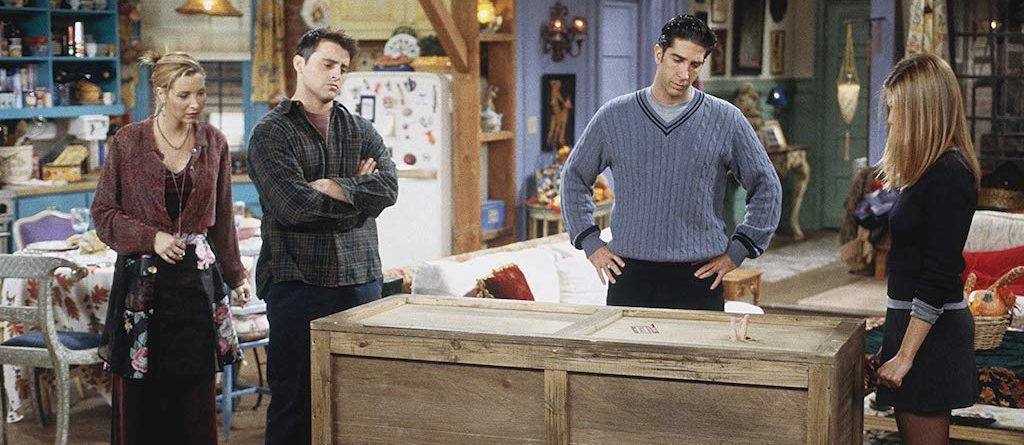
The final episode of NBC’s hugely popular sitcom Friends aired more than a decade and a half ago, but its popularity hasn’t waned one bit for one simple reason: there’s just no replacing a good Friends rewatch. Between Ross and Rachel’s seasons-long will-they-or-won’t-they dynamic and Monica and Chandler’s surprisingly sweet coupling, to Joey and Chandler’s hilarious misadventures as roommates and Phoebe’s explorations of New York eclecticism, Friends had (and still has) plenty to offer. Too much, in fact, which is why we’re trying to whittle it down to the best episodes to watch again now that you can stream the show on HBO Max.
17. The One with the Rumor (Season 8, Episode 9)

The Story: It’s the annual Thanksgiving episode, but with a twist: Their guest is Will, who went to school with Ross, Rachael, and Monica, and who, like Monica, also used to be fat. Oh, and he’s played by Aniston’s then-husband, one Brad Pitt.
Why It’s On This List: When it aired in 2001, this was still a controversial statement: Brad Pitt is hilarious. He may be one of the weirdest funny guys on the planet. He’d been funny plenty of times before, from 12 Monkeys to True Romance to Snatch. But films like Burn After Reading and (you could argue) Inglourious Basterds and Once Upon a Time in Hollywood — where he really let his freak flag fly — were still a ways off, and he was mostly playing solemn studs. This is, if nothing else, a sneak peek of what was to come in his only on-screen performance opposite Anniston.
16. The One with the Umagi (Season 6, Episode 17)

The Story: Monica and Chandler give each other awful Valentine gifts, but much more importantly Rachel and Phoebe start a self-defense class, prompting Ross to show off the skills he doesn’t actually have.
Why It’s On This List: Ross began Friends as the mopey sad guy whose puppy-dog love for Rachel was very emo. But as the show went on, we got to see Ross in a less flattering light. By Season 6, here he was, saying he was an expert in a made-up school of karate called “umagi,” which he claims translated into “a state of total awareness” but which is actually the Japanese word for eel. Watching three people who aren’t good at martial arts fail at what turns into a game of revenge is something else.
15. The One with the Proposal (Part 2) (Season 6, Episode 25)

The Story: Chandler decides to finally pop the question to Monica, but perhaps her mightiest old flame — Tom Selleck’s Richard — decides to return at the most inopportune time.
Why It’s On the List: Monica and Chandler’s relationship isn’t as wild as Ross and Rachel’s; when they realized they loved each other, it didn’t take long for it to get serious, and they were rarely about drama. Still, when Richard returns, it takes two episodes for things to calm down, culminating in one of the most heartfelt scenes in the series, with the ever-sarcastic Chandler delivering a straight-faced proposal to the one he loves. Friends rarely got this serious, which is why the tonal shift works so well.
14. The One After Vegas (Season 6, Episode 1)
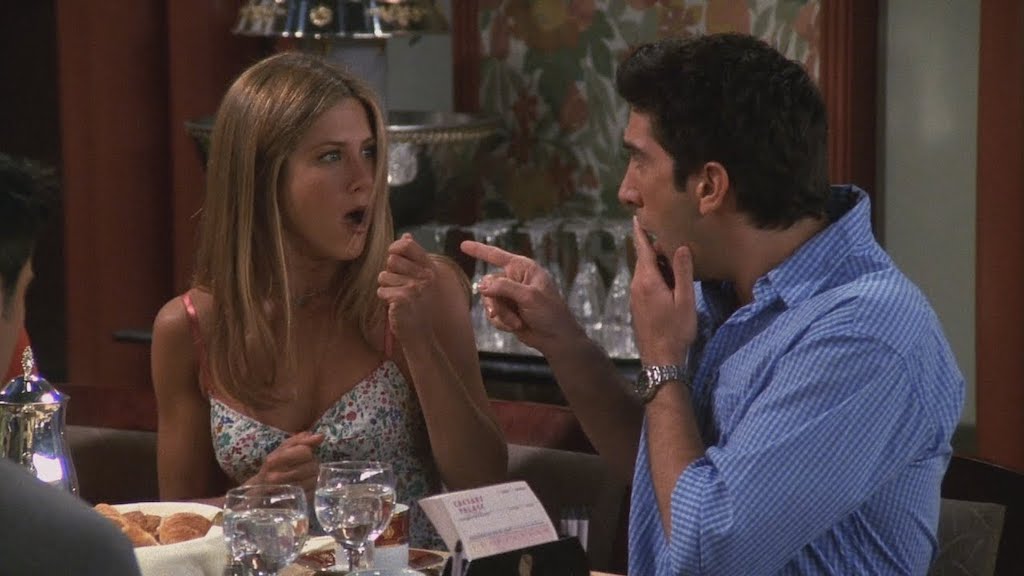
The Story: So, Ross and Rachel got drunkenly married! Now what? Ross doesn’t want another divorce, so he hatches a hare-brained scheme to pretend to get an annulment.
Why It’s On the List: The Season 5 cliffhanger is one of the era’s better ones — a case where the writers wrote themselves into a wall and had to try and write their way out. Watching Ross and Rachel panic is always good fun, but perhaps funnier is the rest of the gang awkwardly dealing with yet another hairpin turn in their rollercoaster ride of a relationship. The MVPs are Phoebe and Joey, who ditch the drama and head off on a road trip that’s very Phoebe and Joey, complete with some good old “Space Oddity.”
13. The One Where Ross Finds Out (Season 2, Episode 7)
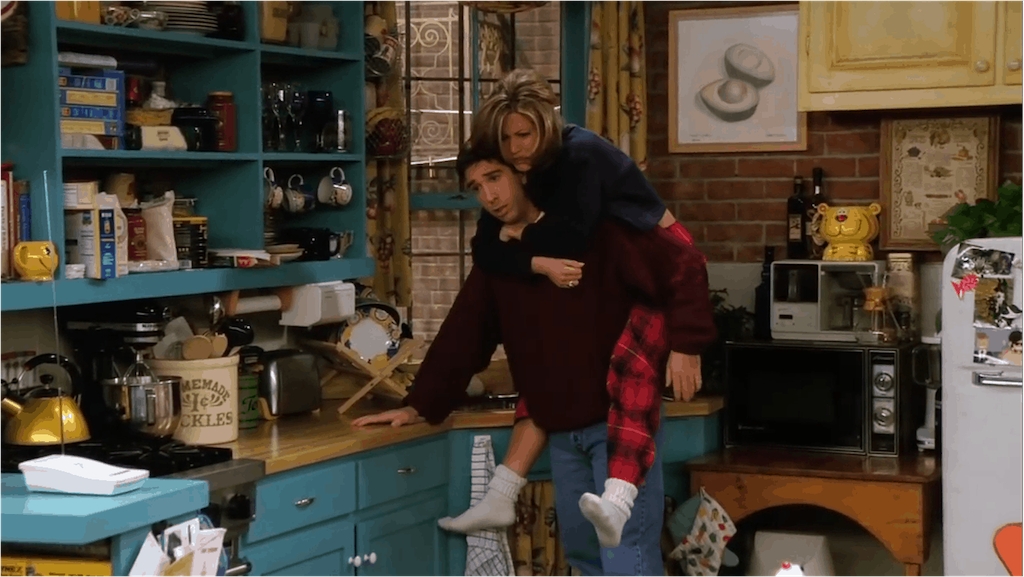
The Story: Rachel knows Ross loves her but Ross, who’s still dating Julie (Lauren Tom), doesn’t know that she knows. Rachel leaves a drunken phone message in which she confesses her feelings, and when Ross finds out, at first he’s furious with her. But he can’t stay mad for long.
Why It’s On the List: It took a whole season of Cheers for Sam and Diane to first hook up, but Ross and Rachel’s “will they or won’t they?” stretched over a season and a third. Their first kiss was like a pressure cooker expelling all its air at once…and of course, thanks to some melodramatic turns, it would take them a bit longer to make things official. But not only is it a relief, but the build-up in the episode is hilarious; Rachel’s leaping atop Ross’ shoulder, trying to prevent him from listening to her soused recording, is top-shelf physical comedy. The b-plot, in which Chandler quickly regrets enlisting Monica as his personal trainer, is good stuff, too.
12. The One With The Stoned Guy (Season 1, Episode 15)
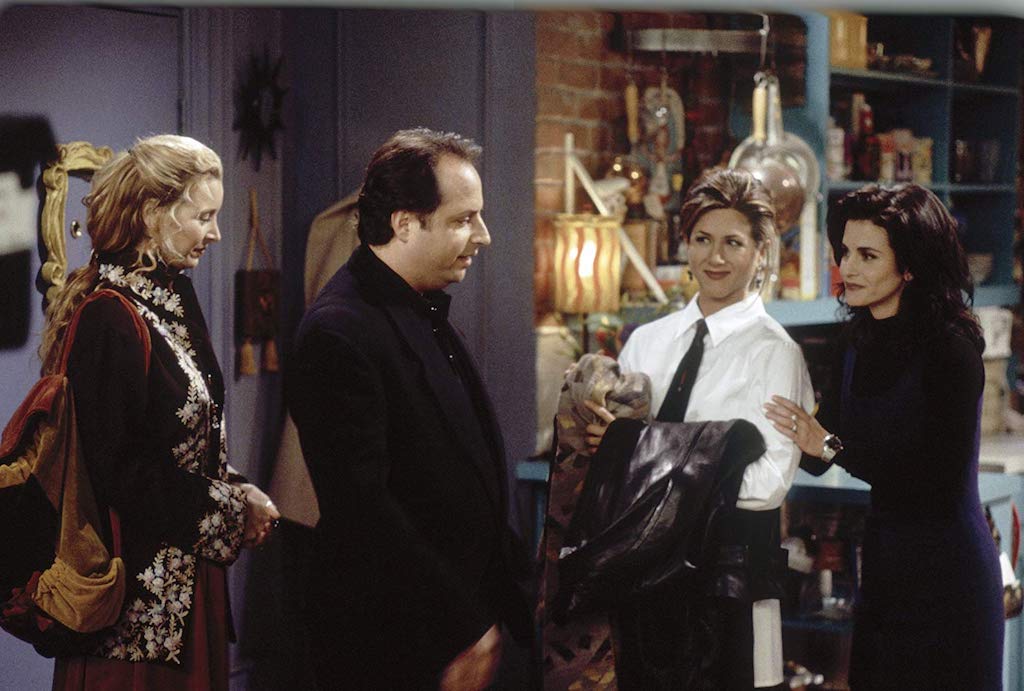
The Story: Rachel and Phoebe try to help as Monica tries to impress a prospective new boss while Ross struggles with a romantic request and with asking Joey for advice.
Why It’s On The List: Jon Lovitz is hilarious as Steve, a restaurant owner who drops by the apartment to get a cooking demonstration from Monica. Unfortunately, Steve goes from Lovitz’s prickly brand to stoned out of his mind, foraging for snacks in the kitchen after a brief fascination with the word “tartlet.”
Despite Lovitz’s top-shelf cameo, however, the episode’s best moment may be Chandler walking in on Joey somewhat forcefully teaching Ross the art of dirty talk after an embarrassing whiff he had on a date. It’s not how Chandler comes out of his room after Joey demands Ross tell him he wants to caress his but; it’s seeing Chandler’s joy over this sudden walk-in as Ross and Joey realize that they are not alone. The laugh was there in the set-up but the patience to let it develop and have Chandler bask in the awkwardness elevates the moment.
11. The One With Chandler In A Box (Season 4, Episode 8)
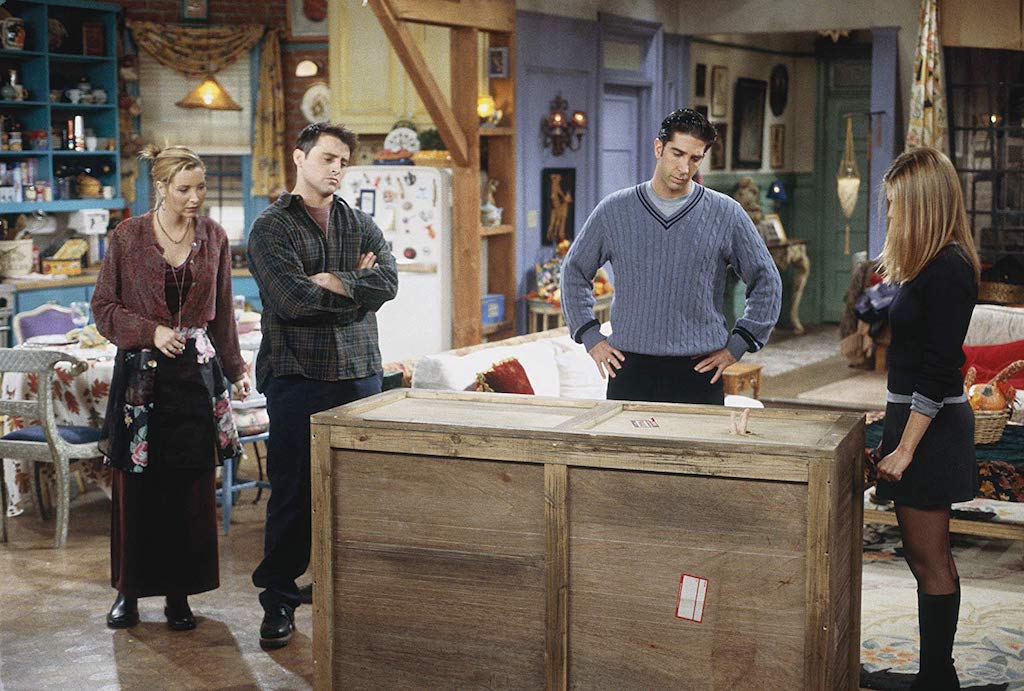
The Story: Monica gets a reminder about a past relationship and Chandler goes to extremes to repair his friendship with Joey.
Why It’s On The List: Thanksgiving gets awkwardness as the gang judges Monica for her romantic interest in her (much older) ex-boyfriend’s son (which prompts a fantastic takedown of everyone else’s romantic and life missteps by Monica). Meanwhile, Chandler puts himself in a box to try and atone for kissing Joey’s then-girlfriend, Kathy.
The long play with Chandler in the box yields a lot of laughs, but the emotional cusp of the whole episode finds Kathy (Paget Brewster) deciding she can’t break up Joey and Chandler’s friendship, forcing Joey to move past his anger and free Chandler from the box so he can go after the girl he loves. It’s a nice reminder of the deep affection these characters have for each other and the dimension it adds to the show.
10. The One With Ross’ Wedding (Season 4, Episodes 23 & 24)
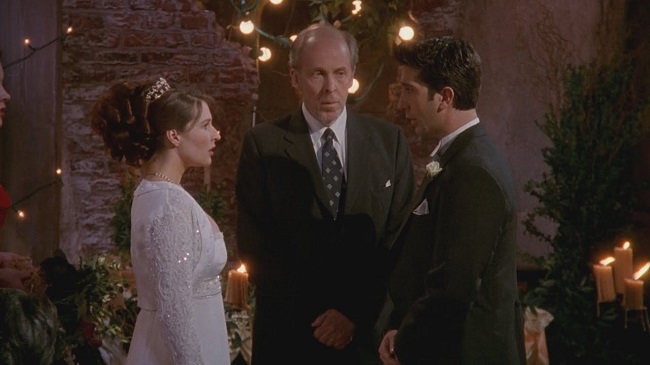
The Story: The final two episodes of the fourth season find Ross and Emily nervously preparing to get married in London. It’s a wreck of a story that comes to define the show’s story for many seasons after.
Why It’s On The List: Technically, this is a cheat, as “The One With Ross’ Wedding” is actually a two-parter. (Spoilers: so is the next entry.) But that’s okay because to truly appreciate the scope of the story’s brilliance, you have to watch both episodes. Even if you don’t really know the Rachel/Ross backstory, there is plenty here to understand how sad and moving their complex pairing is in these episodes. Phoebe and Joey get plenty of laughs on the sidelines, but the other gem is Monica and Chandler’s fling — which will blossom into something more in later seasons.
9. The One With Monica And Chandler’s Wedding (Season 7, Episodes 23 & 24)
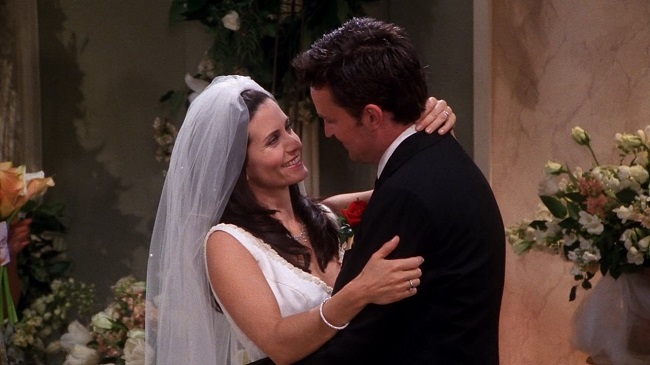
The Story: Speaking of nervous weddings and the flings that precede them, three seasons later, the two-part finale finds Monica and Chandler tying the knot with Joey serving as minister and Rachel, Phoebe and Ross looking on.
Why It’s On The List: While the previous entry’s one caveat would be that what makes it great comes at Emily’s expense, these two episodes manage to pull just as many successful comedic punches without any unnecessary bruising. From Ross’ attempts to seem like a physically domineering older brother to a touching moment with Chandler staring at a baby onesie in a gift shop, these episodes have got it all. They’re especially a good representation of a “faking” plot, in which some of the characters must distract one or two others from some possibly damning bit of information. In this case, it’s the fact that Chandler has suddenly gotten cold feet about marrying Monica.
8. The One With The Football (Season 3, Episode 9)
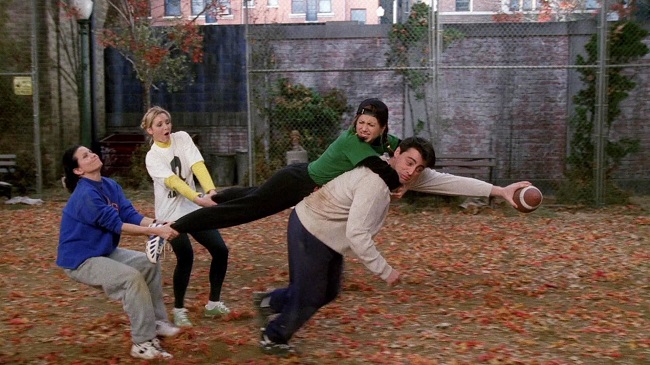
The Story: While watching a Thanksgiving Day football game together, everyone decides to play a game of their own — despite Monica and Ross’ reluctance due to a mishap at the sixth annual Geller Cup.
Why It’s On The List: More than anything, this episode is a perfect example of something that Friends (and many other pre-bingable shows) is well known for: “bottle” episodes. That is to say, it’s a self-contained story that, while it does make occasional references to larger themes and arcs running through the series, stands perfectly on its own two feet. Or, at least it does while it’s not getting tackled. There are plenty of fun throwaway gags to go around (like Chandler and Joey’s mutually failed attempts to woo a random passerby), but Monica and Ross’ intense competitiveness takes the title.
7. The One With All The Resolutions (Season 5, Episode 11)
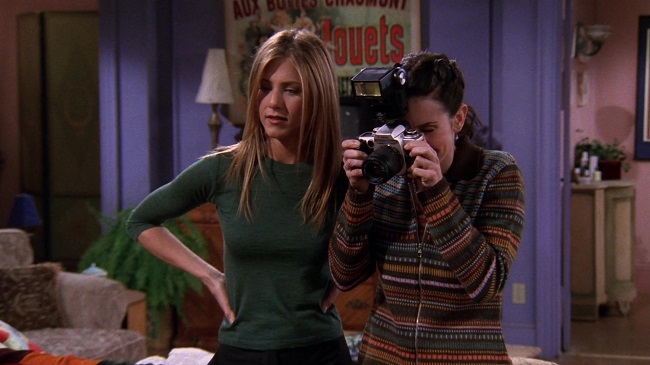
The Story: For New Year’s Eve 1999, the gang shares their resolutions with each other and decides to support them as best as they can.
Why It’s On The List: Of course, most of these resolutions are only as good as the support that’s been promised. Case in point: Ross’ ridiculous leather pants. Since he wants to try something new every day, he decides to try wearing said pants, and since Chandler has given up making fun of everyone for a week, he can’t say the obvious. So Ross learns the hard way on a date, during which he calls Joey for (some terribly bad) advice about how to de-shrink his sweat-soaked pants. This saga isn’t the entire the episode, but it remains one of its hallmarks and one of the series’ best Ross gags.
6. The One With The Cop (Season 5, Episode 16)
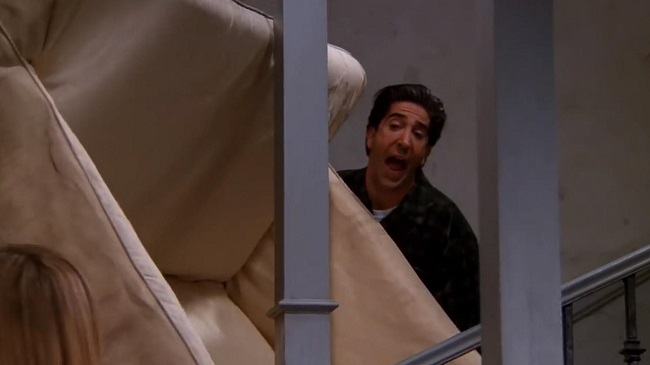
The Story: Phoebe discovers a forgotten wallet with a police badge at Central Perk and uses it to scare people into behaving themselves in public, including the cop who lost it in the first place.
Why It’s On The List: Phoebe’s run-in with the cop whose badge she’s been brandishing results not in her arrest, but in a first date. The sweetness of this, and Rachel’s attempts to help Joey make more female friends, notwithstanding, the real meat of this episode is Ross’ new couch. He decides to deliver it himself to save money and tries to enlist his friends’ help, resulting in the iconic “pivot” scene and its subsequent meme. On the one hand, it’s yet another example of how mind-numbingly frustrating Ross can be. On the other hand, the schadenfreude that comes from watching his couch crumble is pure bliss.
5. The One With The Blackout (Season 1, Episode 7)
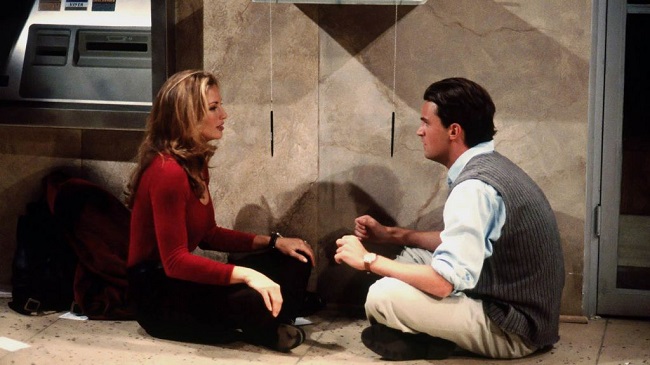
The Story: A city-wide blackout strands most of the group in Monica’s apartment, while Chandler finds himself trapped in an ATM with Victoria’s Secret model Jill Goodacre.
Why It’s On The List: Most of the first season sees Ross realizing that he never got over Rachel from their high school days, and this almost comes to a head in this episode. As his bad luck would have it, of course, a series of unfortunate events plague his plans to confess his feelings to her. These include a neighbor’s lost cat, which latches onto Ross, and the cat’s owner Paolo, a muscular Italian man who subsequently woos Rachel. As for Chandler’s time with Jill, what starts as a serendipitous meeting turns into a sweet conversation and a kiss. That, and a joke about bank security cameras.
4. The One Where No One’s Ready (Season 3, Episode 2)
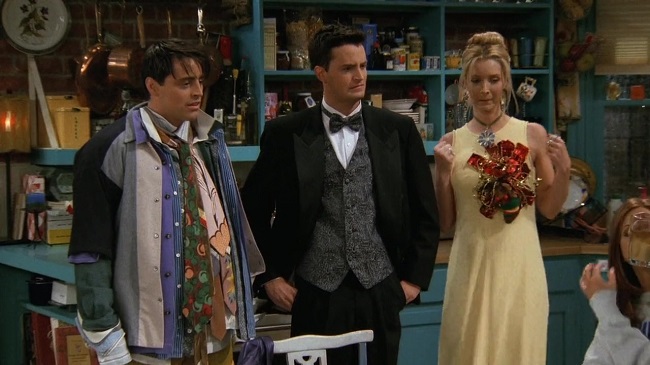
The Story: No one is ready to attend a function on time.
Why It’s On The List: Another one of Friends‘ fantastic “bottle” episodes, this one is rife with plenty of the show’s trademark silliness. From Chandler and Joey’s escalating prank war that results in Joey wearing all of Chandler’s clothes at the same time, to Monica’s repeated attempts to answer, erase and revise what she believes to be an ex-boyfriend’s old message, it’s a goofball of a half-hour sitcom entry. The more Monica tries to fix (or forget) things with Richard, the worse it gets for her — and the funnier it gets for everyone around her.
3. The One With The Prom Video (Season 2, Episode 14)
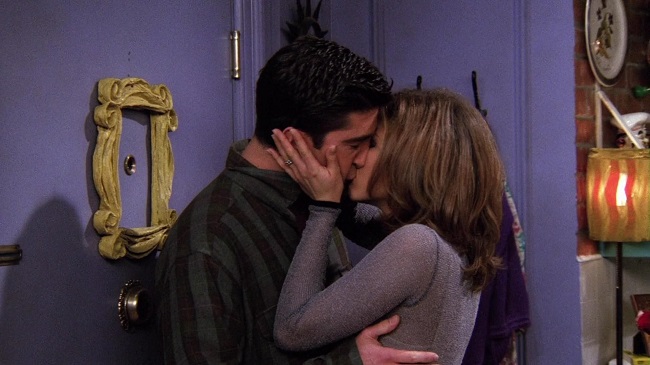
The Story: When Ross and Monica’s parents drop off some of the latter’s things, she finds an old videotape of her and Rachel getting ready for their senior prom.
Why It’s On The List: Anytime a television comedy has an excuse to go retro and reveal what its characters looked like in a previous decade, it should do it. So cue the perms and bad mustaches, because this one’s got it all. Or, rather, a younger, lovelorn Ross has got it all. Despite the fact that Ross and Rachel are fighting throughout much of this episode, the initially embarrassing tape reveals just how much in love he is, and has always been, with her. Also, it ends with Monica discovering what amounts to a sex tape her parents recorded, so that’s hilarious.
2. The One With The Embryos (Season 4, Episode 12)
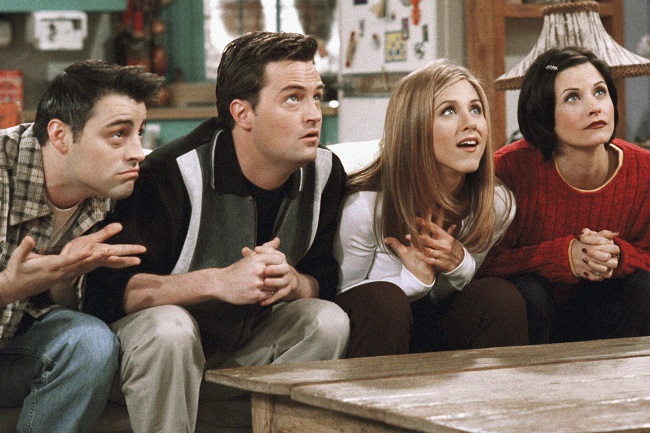
The Story: Phoebe agrees to be a surrogate mother while everyone else gets into a highly competitive game of friendly trivia.
Why It’s On The List: Never underestimate the competitiveness of Monica Geller. She refused to let go of the football from her brother Ross in the above Thanksgiving episode, and she’s not going to back down from some fun wagers with the boys — despite Rachel’s timidity about it all. Then again, between their pet duck and their chick-turned-rooster, Chandler and Joey have a lot to lose on this one. They also have a lot to gain, as Monica happily agrees that, should they win, they’ll get to take the girls’ apartment. None of this is meant to undermine the far more serious nature of Phoebe’s story, which has plenty of its own silly elements, but it’s all quite memorable nonetheless.
1. The One Where Everybody Finds Out (Season 5, Episode 14)

The Story: Everyone ultimately learns that Monica and Chandler are secretly in a relationship.
Why It’s On The List: There are many Friends episodes, including the ones listed above, that hardcore fans of the show will point to and go, “That one!” As in, “Start with that one. It best represents it.” But more often than not, they will namedrop this fifth season gem in which everyone (even Ross) finally finds out that Monica and Chandler are an item. The pair have been keeping it secret ever since Ross’ disastrous London wedding at the end of season four, but we all know the secrecy would last. First Joey found out, then Rachel, and now Phoebe knows. Ross ultimately discovers it by the episode’s end when he’s trying to get to the Ugly Naked Guy’s apartment amidst a bout of crippling anger issues.
Updated 6/22/20 – Jason Tabrys also contributed to this article
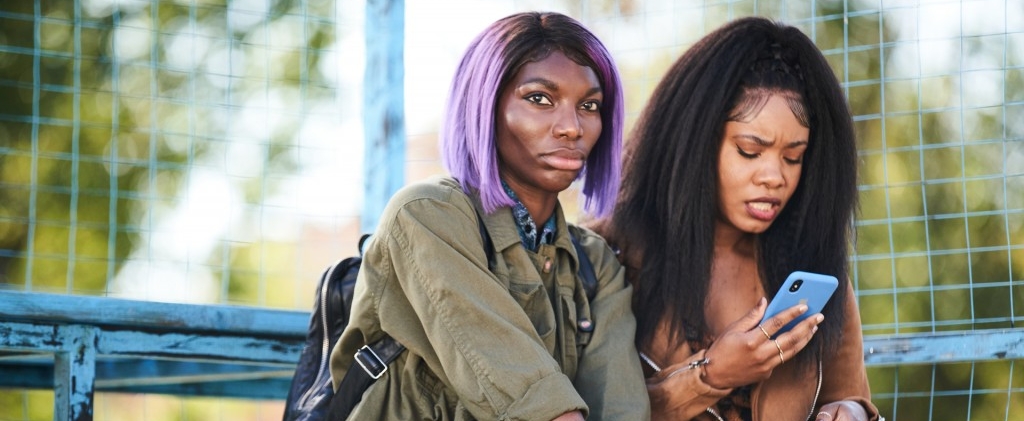
If nothing below suits your sensibilities, check out our guide to What You Should Watch On Streaming Right Now.
I May Destroy You (HBO, 9:00 p.m.) — Three months before the blank-spot in Arabella’s memory happened, Terry visits Arabella in Italy, and the two have a wild night of partying and drug use, all on her agent’s dime. Michaela Coel is killing it with this series, which is both brutally honest about the ripple effects of sexual assault and, at times, darkly funny.
The Politician (Netflix) — Again, not much is happening on cable TV right now, so your best bet is still streaming, and Netflix gave us plenty to watch over the weekend. Ryan Murphy’s dark political comedy is back for more, but this time, Payton Hobart has graduated from rigging high school elections to unseating New York Senator Dede Standish (Judith Light). And he’s doing it in some morally sticky ways. Like exposing some conspiracy cover-ups and scandalous throuples to get ahead in the polls.
Wasp Network (Netflix) — Olivier Assayas directs this star-studded spy drama. It’s a who’s-who cast-wise — think Ana de Armas, Penelope Cruz, Edgar Ramirez, and Gael García Bernal — and the story centers on a Cuban airplane pilot (Ramirez) who leaves his wife (Cruz) and daughter behind to infiltrate an anti-Castro organization in Miami.
The Bachelor: The Greatest Seasons – Ever! (ABC, 8:00 p.m.) — It’s that time. The show looks back at Ben Higgins’ Bachelor season, which started with heartbreak and ended with two surprising love confessions.

When Disney+ announced that Hamilton would hit its streaming service in July, fans were noticeably concerned that Disney would censor the hit musical in order to keep it “family friendly.” It also didn’t help that when the announcement was made back in May, even Hamilton creator Lin-Manuel Miranda wasn’t entirely sure what changes would have to be made to prevent an R-rating, but he promised to keep them minimal.
“I think we’ll figure it out when we get there, but we’re not going to cut any sections of the show,” Miranda told New York Times reporter Kyle Buchanan at the time. “If we have to mute a word here or there to reach the largest audience possible, I’m OK with that, because your kids already have the original language memorized. I don’t think we’re depriving anyone of anything if we mute an f-bomb here or there to make our rating.”
Following the release of the official trailer for Hamilton on Disney+, Miranda took to Twitter to address fan concerns after they noticed that the musical had landed the desired PG-13 rating. Turns out, he was shooting it straight back in May when he promised not to cut a single scene and that the most amount of censorship would be muting an f-bomb here and there. Two, to be exact:
MPAA has a hard rule about language: more than 1 utterance of “F**k” is an automatic R rating. We have 3 “F**ks” in our show. So I literally gave two f**ks so the kids could see it:
1. In Yorktown, there’s a mute over “I get the f___ back up again”
2. ‘Southern “record scratch*kin’ Democratic Republicans.”
You can sing whatEVER you like at home (even sync up the album)!
You can see Lin-Manuel Miranda’s full statement below:
…I literally gave two fucks so the kids could see it:
1. In Yorktown, there’s a mute over “I get the f___ back up again”
2. “Southern *record scratch*kin’ Democratic Republicans.”
You can sing whatEVER you like at home (even sync up the album)!
Love you. Enjoy.— Lin-Manuel Miranda (@Lin_Manuel) June 22, 2020
Hamilton hits Disney+ on July 3.

The NWSL is set to be the first U.S. team sports league to return to the field when they begin the month-long Challenge Cup this weekend in Utah, but they will now be without an entire team for that competition as the Orlando Pride announced on Monday they would be voluntarily withdrawing from the competition due to positive COVID-19 tests by players and staff.
According to the Pride’s release, an undisclosed number of players and staff members tested positive, and while all were asymptomatic they were withdrawing from the competition to help protect their players and staff, those they live with, as well as the other teams in the tournament.
“This was obviously a difficult and disappointing outcome for our players, our staff and fans, however this is a decision that was made in order to protect the health of all involved in the Challenge Cup,” said Orlando Pride EVP Amanda Duffy. “While we were all excited to see the 2020 Pride on the field this weekend, our priority is now making sure our players and staff safely recover and providing any support wherever and however possible.”
“While we were all looking forward to seeing the Pride return to the field, we are unfortunately facing a decision that is necessary and in the best interest for the health of our players and staff. The decision goes far beyond just the positives, but also taking into consideration roommates or partners,” said Daryl Osbahr, M.D., team doctor for Orlando Pride and chief of sports medicine for Orlando Health. “I commend the Club for its diligence and reaction following the initial positive test, as well as how the safety of players and staff was prioritized during this difficult and uncertain time. However the guidelines and process that are put in place, including the important protocols and timelines for contact tracing, make it logistically impossible for the Club to participate in the Challenge Cup in Utah.”
The Orlando area has seen a significant spike in recent weeks after the state of Florida has rapidly expanded its re-opening plan, and hopefully the players and staff that tested positive will remain asymptomatic. The Pride have shut down their training facility and will have it cleaned and sterilized, but it gives an indication of just how perilous all of the return to play plans are once testing begins and the scope of the pandemic’s effects are realized.
The NWSL has yet to issue an official statement on the Pride’s withdrawal, but will surely offer an update to scheduling for the tournament relatively soon.

NASCAR’s Bubba Wallace took a bold stance two weeks ago by pushing the sport to ban the Confederate flag from its events.
Just two days later, NASCAR released a statement announcing the ban, saying that “The presence of the Confederate flag at NASCAR events runs contrary to our commitment to providing a welcoming and inclusive environment for all fans, our competitors and our industry.”
Wallace is the only full-time black driver in NASCAR’s top circuit. He drives the No. 43 car with Richard Petty Motorsports.
Wallace’s bravery was challenged by an extremely cowardly and racist act on Sunday when a noose was hung in his garage at the Talladega Superspeedway in Lincoln, Alabama. There were also many Confederate flags flown outside of the raceway in protest of NASCAR’s ban.
Fortunately, according to ESPN, a member of Wallace’s team found the noose before Wallace and quickly notified NASCAR authorities.
The incident prompted a stern response from NASCAR.
“Late this afternoon, NASCAR was made aware that a noose was found in the garage stall of the 43 team. We are angry and outraged, and cannot state strongly enough how seriously we take this heinous act,” NASCAR said in a statement. “We have launched an immediate investigation, and will do everything we can to identify the person(s) responsible and eliminate them from the sport.”
“As we have stated unequivocally, there is no place for racism in NASCAR, and this act only strengthens our resolve to make the sport open and welcoming to all.”
Wallace knew there was going to be a backlash to his push to have the flags removed but that didn’t stop him from speaking out. “There’s going to be a lot of angry people that carry those flags proudly but it’s time for change,” he said.
Athletes from across the world of American sports have come together to support Wallace in the aftermath of the ugly incident. Many of NASCAR’s biggest names apoke out on Twitter.
Los Angeles Laker LeBron James, arguably the most popular athlete in America, also sent a message of support for Wallace, calling the incident “Sickening!”
Athletes from the NFL, PGA Tour, and even the WWE, sent their support as well.
Wallace has no intention of letting the incident stop his attempts to eliminate racism from the sport.
“Together, our sport has made a commitment to driving real change and championing a community that is accepting and welcoming of everyone,” he said in a statement. “Nothing is more important and we will not be deterred by the reprehensible actions of those who seek to spread hate.
“As my mother told me today, ‘They are just trying to scare you,'” he said. “This will not break me, I will not give in nor will I back down. I will continue to proudly stand for what I believe in.”
In a show of solidarity on Monday, NASCAR drivers and crews pushed Wallace’s car to the front of the grid at Talladega before the race.
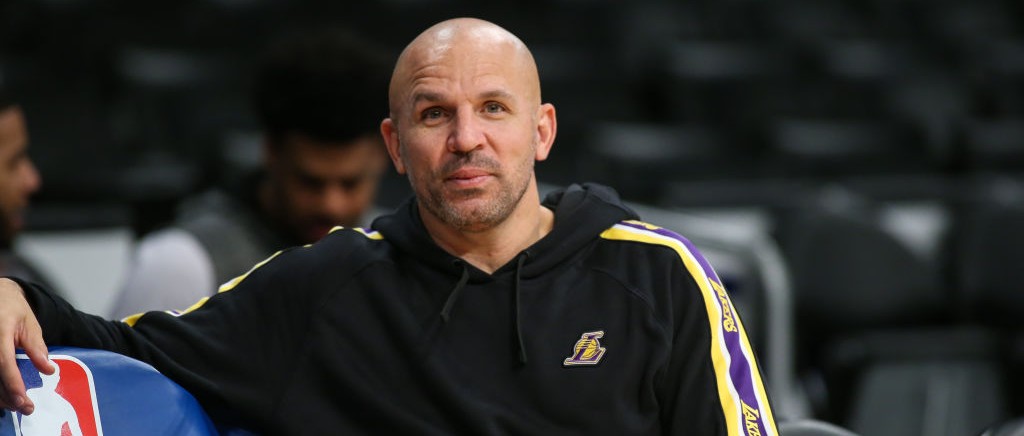
The New York Knicks are among the eight teams whose offseasons have officially begun, as they will not be part of the planned 22-team restart in Orlando later this summer. While there will be major decisions to make in October regarding the draft and free agency, the first order of business in Manhattan is finding their next head coach.
It has been the prevailing thought of many that former Bulls and Wolves coach Tom Thibodeau would get the Knicks job, but Leon Rose is doing his due diligence and going through a full interview process, including some other intriguing names. Warriors assistant and former Cavs head coach Mike Brown is reportedly on the Knicks list for interviews, along with Spurs assistant Will Hardy and Sixers assistant Ime Udoku. Recently fired Nets coach Kenny Atkinson is also a strong contender for the job.
On Monday, another name emerged, as Marc Stein of the New York Times confirmed rumblings that ex-Nets and Bucks head coach Jason Kidd, currently an assistant with the Lakers, was on the Knicks list of candidates and that the Lakers had granted New York permission to interview him.
The Knicks have requested and received permission to interview the Lakers’ Jason Kidd for their head coaching vacancy, @NYTSports has learned
— Marc Stein (@TheSteinLine) June 22, 2020
Kidd’s tenure in Brooklyn and Milwaukee saw some on-court success, but also came with lots of grumblings about his hard nosed approach as well as conflicts with management over power dynamics. He has drawn nothing but positive reviews from those around the Lakers this year, and there seems to be some indication that some time away from the lead spot on the bench has shifted his perspective a bit and given him a better relationship with those in the front office.


